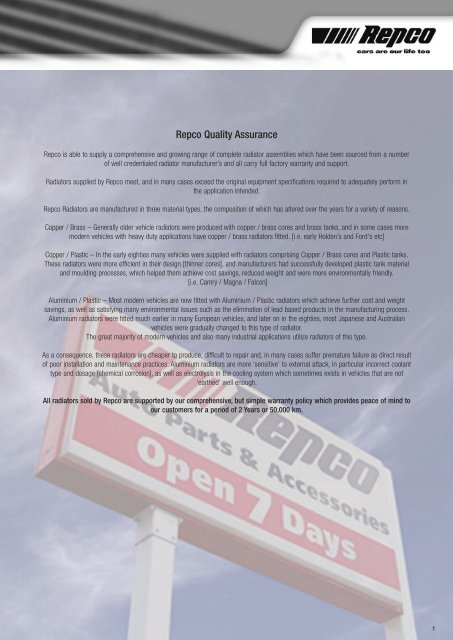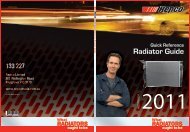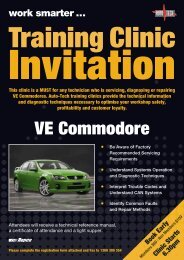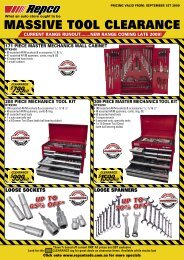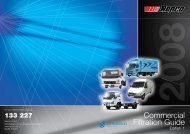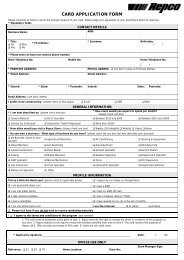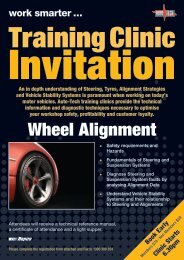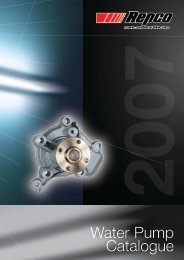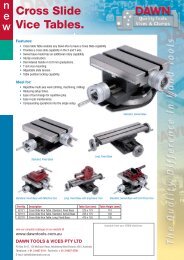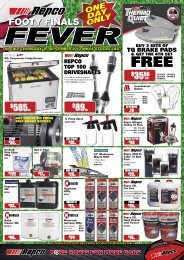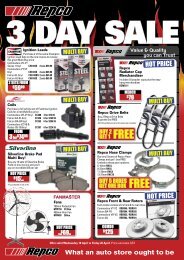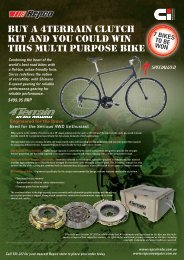45005_Repco_08 Radiator Application Guide Master - Repco Trade ...
45005_Repco_08 Radiator Application Guide Master - Repco Trade ...
45005_Repco_08 Radiator Application Guide Master - Repco Trade ...
Create successful ePaper yourself
Turn your PDF publications into a flip-book with our unique Google optimized e-Paper software.
<strong>Repco</strong> Quality Assurance<br />
<strong>Repco</strong> is able to supply a comprehensive and growing range of complete radiator assemblies which have been sourced from a number<br />
of well credentialed radiator manufacturer’s and all carry full factory warranty and support.<br />
<strong>Radiator</strong>s supplied by <strong>Repco</strong> meet, and in many cases exceed the original equipment specifications required to adequately perform in<br />
the application intended.<br />
<strong>Repco</strong> <strong>Radiator</strong>s are manufactured in three material types, the composition of which has altered over the years for a variety of reasons.<br />
Copper / Brass – Generally older vehicle radiators were produced with copper / brass cores and brass tanks, and in some cases more<br />
modern vehicles with heavy duty applications have copper / brass radiators fitted. [i.e. early Holden’s and Ford's etc]<br />
Copper / Plastic – In the early eighties many vehicles were supplied with radiators comprising Copper / Brass cores and Plastic tanks.<br />
These radiators were more efficient in their design [thinner cores], and manufacturers had successfully developed plastic tank material<br />
and moulding processes, which helped them achieve cost savings, reduced weight and were more environmentally friendly.<br />
[i.e. Camry / Magna / Falcon]<br />
Aluminium / Plastic – Most modern vehicles are now fitted with Aluminium / Plastic radiators which achieve further cost and weight<br />
savings, as well as satisfying many environmental issues such as the elimination of lead based products in the manufacturing process.<br />
Aluminium radiators were fitted much earlier in many European vehicles, and later on in the eighties, most Japanese and Australian<br />
vehicles were gradually changed to this type of radiator.<br />
The great majority of modern vehicles and also many industrial applications utilize radiators of this type.<br />
As a consequence, these radiators are cheaper to produce, difficult to repair and, in many cases suffer premature failure as direct result<br />
of poor installation and maintenance practices. Aluminium radiators are more ‘sensitive’ to external attack, in particular incorrect coolant<br />
type and dosage [chemical corrosion], as well as electrolysis in the cooling system which sometimes exists in vehicles that are not<br />
‘earthed’ well enough.<br />
All radiators sold by <strong>Repco</strong> are supported by our comprehensive, but simple warranty policy which provides peace of mind to<br />
our customers for a period of 2 Years or 50,000 km.<br />
1


